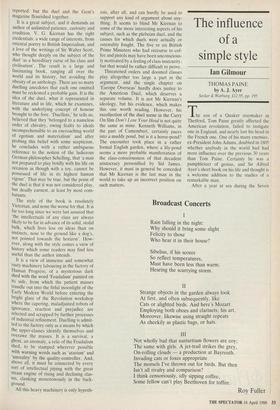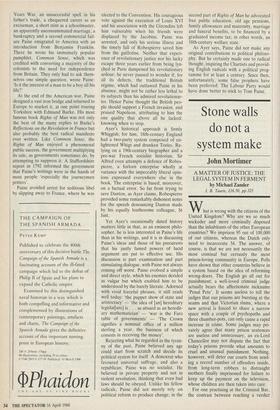The influence of a simple style
Ian Gilmour
THOMAS PAINE by A. J. Ayer
Secker & Warburg, £12.95, pp. 195
The son of a Quaker staymaker in Thetford, Tom Paine greatly affected the American revolution, failed to instigate one in England, and nearly lost his head in the French one. One of his many enemies, ex-President John Adams, doubted in 1805 whether anybody in the world had had more influence over the previous 30 years than Tom Paine. Certainly he was a pamphleteer of genius, and Sir Alfred Ayer's short book on his life and thought is a welcome addition to the studies of a remarkable man.
After a year at sea during the Seven
Years War, an unsuccessful spell in his father's trade, a chequered career as an exciseman, a short stint as a schoolmaster, an apparently unconsummated marriage, a bankruptcy and a second commercial fail- ure Paine emigrated to America with an introduction from Benjamin Franklin. There he wrote his immensely popular pamphlet, Common Sense, which was credited with converting a majority of the colonists to the need for independence from Britain. They only had to ask them- selves one simple question, wrote Paine: 'Is it the interest of a man to be a boy all his life?'
At the end of the American war, Paine designed a vast iron bridge and returned to Europe to market it, at one point touring Yorkshire with Edmund Burke. His most famous book Rights of Man was not only the best of the many replies to Burke's Reflections on the Revolution in France but also probably the best radical manifesto ever written. Like Common Sense, the Rights of Man enjoyed a phenomenal public success, the government multiplying its sale, as governments sometimes do, by attempting to suppress it. A Staffordshire report in 1792 informed the government that Paine's writings were in the hands of most people 'especially the journeymen potters'.
Paine avoided arrest for seditious libel by slipping away to France, where he was elected to the Convention. His courageous vote against the execution of Louis XVI and his association with the Girondins left him vulnerable when his friends were displaced by the Jacobins. Paine was arrested, and only his serious illness and the timely fall of Robespierre saved him from the guillotine. Neither that experi- ence of revolutionary justice nor his lucky escape three years earlier from being lyn- ched in Paris dampened his revolutionary ardour; he never paused to wonder if, for all its defects, the traditional British regime, which had outlawed Paine in his absence, might not be rather less lethal to its subjects than his admired revolutionar- ies. Hence Paine thought the British peo- ple should support a French invasion, and praised Napoleon, attributing to him the one quality that above all he lacked: knowing when to stop.
Ayer's historical approach is firmly Whiggish; for him, 18th-century England had a two-party system composed of en- lightened Whigs and drunken Tories. Re- lying on a 19th-century biographer and a pre-war French socialist historian, Sir Alfred even attempts a defence of Robes- pierre, a forlorn enterprise wholly at variance with the impeccably liberal opin- ions expressed everywhere else in the book. The enterprise is based, moreover, on a factual error. So far from trying to save Danton, as Ayer claims, Robespierre provided some remarkably dishonest notes for the speech denouncing Danton made by his equally loathesome colleague, St Just.
Yet Ayer's occasionally dated history matters little in that, as an eminent philo- sopher, he is less interested in Paine's life than in his writings, and it is in discussing Paine's ideas and those of his precursors that his justly famed powers of lucid argument are put to effective use. His discussion is part examination and part stimulating dialogue, with Paine not always coming off worst. Paine evolved a simple and direct style, which his enemies derided as vulgar but which enabled him to be understood by the barely literate. Adorned with vivid forceful phrases, it still reads well today: 'the puppet show of state and aristocracy' — 'the idea of [an] hereditary legislat[ure] is . . . as absurd as an heredit- ary mathematician' — 'war is the Faro table of governments' — 'The Crown signifies a nominal office of a million sterling a year, the business of which consists in receiving the money'.
Rejecting what he regarded as the tyran- ny of the past, Paine believed any age could start from scratch and decide its political system for itself. A democrat who favoured universal suffrage, and also a republican, Paine was no socialist. He believed in private property and not in violent revolution, thinking that even bad laws should be obeyed. Unlike his fellow radicals, Paine did not merely rely on political reform to produce change; in the
second part of Rights of Man he advocated free public education, old age pensions, family allowances and maternity, marriage and funeral benefits, to be financed by a graduated income tax; in other words, an 18th-century welfare state.
As Ayer says, Paine did not make any original contributions to political philoso- phy. But he certainly made one to radical thought, inspiring the Chartists and provid- ing English radicals with a political prog- ramme for at least a century. Since then, unfortunately, some false prophets have been preferred. The Labour Party would have done better to stick to Tom Paine.































































 Previous page
Previous page